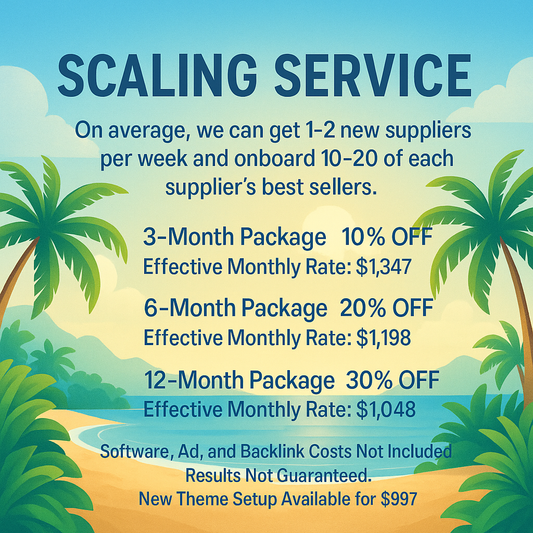
2024 Tax Considerations for High Ticket Dropshipping Entrepreneurs

As we enter a new year, high ticket dropshipping continues to be a lucrative business model for entrepreneurs looking to tap into the e-commerce industry. However, with success comes the responsibility of managing your finances effectively, including navigating the complex world of taxes. In this blog post, we will explore the tax considerations specifically tailored for high ticket dropshipping entrepreneurs in 2024. Understanding these considerations can help you maximize your profits while staying compliant with tax regulations.
1. Business Structure
One of the first decisions you'll need to make as a high ticket dropshipping entrepreneur is choosing the right business structure. Your choice can significantly impact your tax obligations. The most common business structures include sole proprietorship, LLC (Limited Liability Company), S Corporation, and C Corporation. Each has its own tax advantages and disadvantages, so it's essential to consult with a tax professional or an attorney to determine which structure is best for your specific situation.
2. Sales Tax Compliance
Sales tax compliance is crucial for e-commerce businesses, especially those involved in high ticket dropshipping. As of 2024, sales tax laws are continually evolving, and the responsibility for collecting and remitting sales tax may fall on you, depending on your business's location and your customers' location. Be sure to keep up with state and local sales tax regulations and consider using software or hiring a tax professional to help you stay compliant.
3. Inventory Management
Efficient inventory management can positively impact your taxes. High ticket dropshipping often involves holding inventory, even if it's at a third-party fulfillment center. Keeping track of your inventory levels accurately can help you claim deductions for the cost of goods sold (COGS), which can reduce your taxable income.
4. Deductible Expenses
The IRS allows business owners to deduct legitimate business expenses to lower their taxable income. As a high ticket dropshipping entrepreneur, you may be eligible to deduct expenses such as:
- Advertising and marketing costs
- Shipping and fulfillment expenses
- Website hosting and maintenance fees
- Office supplies and equipment
- Business insurance premiums
- Home office deductions (if applicable)
- Professional fees (tax preparation, legal, etc.)
Maintaining detailed records of these expenses is essential to claim the deductions you're entitled to.
5. International Sales
If your high ticket dropshipping business involves international sales, you'll need to understand the tax implications of importing and exporting goods. Customs duties, tariffs, and value-added taxes (VAT) can significantly impact your business's profitability. Collaborating with a customs broker or international tax expert can help you navigate these complexities.
6. Accounting and Recordkeeping
Proper accounting and recordkeeping are essential for any business, but they are particularly crucial for high ticket dropshipping entrepreneurs. Keep detailed records of your sales, expenses, inventory, and financial transactions. Using accounting software or hiring an accountant can help ensure accuracy and make tax filing more manageable.
7. Estimated Taxes
High ticket dropshipping entrepreneurs often have irregular income, making it necessary to pay estimated taxes throughout the year. Failing to do so can result in penalties and interest. Consult with a tax professional to calculate your estimated tax payments accurately and avoid any surprises come tax time.
Conclusion
As a high ticket dropshipping entrepreneur in 2024, understanding and effectively managing your tax considerations is vital for the success and sustainability of your business. While taxes may not be the most exciting aspect of entrepreneurship, they are a critical factor in your financial well-being. By staying informed, seeking professional guidance when needed, and maintaining meticulous records, you can navigate the complex world of taxes and focus on growing your high ticket dropshipping business.


















